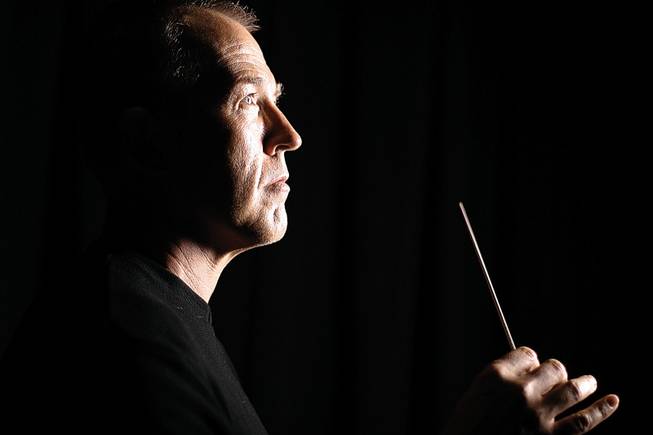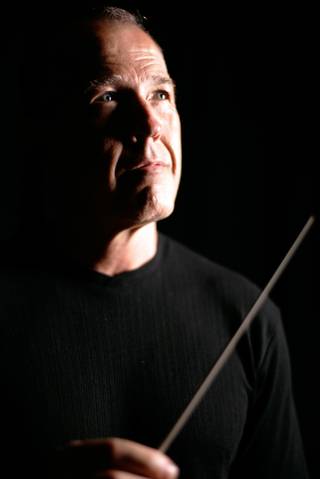Thursday, July 16, 2009 | 2 a.m.
If You Go
- What: “The Lion King”
- When: 8 p.m. Mondays through Thursdays; 4 and 8 p.m. Saturdays and Sundays
- Where: Mandalay Bay
- Tickets: $53 to $168.50; 632-7580
Sun Special Coverage
Sun Archives
- 'The Lion King' brought to life (5-18-2009)
- Mane Attraction (5-13-2009)
- 'The Lion King' announces international cast (3-11-2009)
The orchestra pit beneath “The Lion King’s” stage is a dark, cramped space where 21 musicians sit shoulder to shoulder, hip to hip, performing for a show they can’t see.
Conductor Jay Alger stands at the podium, the back of his head and shoulders visible to the audience.
Because of the tight quarters, it’s difficult for the violinists, cellists, keyboardists and the rest of the members of the orchestra to see Alger’s hand motions, which tell them when to come in, when to speed up or slow down.
Glowing in the darkness are small monitors clipped to music stands. A camera trained on Alger puts his image on the musicians’ screens.
Like in a mobile home, space is at a premium under the stage. There’s a place for everything, everything in its place. There’s no unnecessary movement. The musicians and their instruments are in their spaces. If they have long breaks between pieces they play, they may grab a crossword puzzle from an instrument case and fill in a word or two. They mouth words rather than talk as the story of “The Lion King” unfolds above them.
In the same pit, there were only nine musicians for “Mamma Mia!” — replaced in May by Disney’s feline musical. They had plenty of room to stretch out.
But “The Lion King” has 23 musicians — 24 people including Alger.
Twenty-one musicians are shoehorned into the pit and two percussionists sit above the stage on both sides of the room.
On one recent night, there were 26 people in the pit — substitute musicians were being trained — so space was at an even greater premium. Eventually all of the orchestra members will have subs so that they can afford take time off for illness or vacations or other gigs.
Alger, who has been with such musicals as “Miss Saigon,” “Cats,” “Phantom of the Opera” and “Ragtime,” joined “Lion King” in 2002. He conducted its first national tour for a year before being asked to supervise other “Lion King” companies around the world. After two years he returned to the national tour for a year and then took a break.
He became associate conductor for “Phantom, the Las Vegas Spectacular.”
“I did that for over two years and Disney called and said they needed a conductor for ‘Lion King,’ ” Alger says. He rejoined the road show last summer, not knowing negotiations were under way to bring it to Mandalay Bay.
“A few months after I joined the road show they said, ‘OK, you get to go home again,’ ” he says.
Alger has been with 10 major productions. If this one lasts long enough, he says, he’ll be ready to retire.
“This is the hardest show I’ve ever done — the most difficult, the most intricate,” he says. “It’s not like anything we study in school or at the university because it’s from South Africa. It’s new to all of us. We’d never heard or seen anything like it.
“We have five drummers, and any conductor will tell you one drummer is enough.”
This isn’t your typical orchestra.
It has instruments you find in most orchestras — a string section, horns, reeds — but it is heavy on percussion and flutes, the instruments that give the musical its texture and deep emotions.
“Two or three numbers in the show are just percussion, no melodic instruments whatsoever, just percussion and singers.”
There are five drums, more than 15 percussion instruments, numerous cymbals, gongs, shakers and rattles, and a dozen or so flutes.
Alexander “Sasha” Viazovtsev, who was born in Siberia, is the company flutist. The 37-year-old musician began playing flute at age 8 and left Russia almost 10 years ago to study at the Cincinnati College Conservatory of Music. After four years at the school he began performing with symphonies across the country. “The Lion King” is his first show business gig.
His main instrument is the standard flute, but at conservatory he took classes in ethnic instruments, which gave him the background to play the dozen or so flutes in the show.
“The flutes create different kinds of emotions and expressions,” he says.
Besides a plethora of flutes there are kalimbas (thumb pianos), berimbaus (percussion instruments with a single string struck by a bow) and rainsticks.
But for Alger it’s much more than instrumentation.
“For me, it’s not only the mechanics of the music but the spiritual depths,” Alger says. “It is South African music, and folks in South Africa come out of the womb singing. It’s just in their culture.
“For them this is not just a show, not just a job, it’s their heartbeat — and that rubs off on all of us, which is another reason the show is not like anything else I’ve ever done. It’s like church.”
The music is so complex it took Alger awhile to learn it.
“Before this I felt like I knew what I was doing,” he says. “I have a college degree in music. I did musical theater, a lot of Rogers & Hammerstein. I’d done a lot of Andrew Lloyd Webber. But this is more complex than any of that ever thought of being. It took me a long time to grasp it. And it isn’t only the music but singing in five South African languages.”



Join the Discussion:
Check this out for a full explanation of our conversion to the LiveFyre commenting system and instructions on how to sign up for an account.
Full comments policy